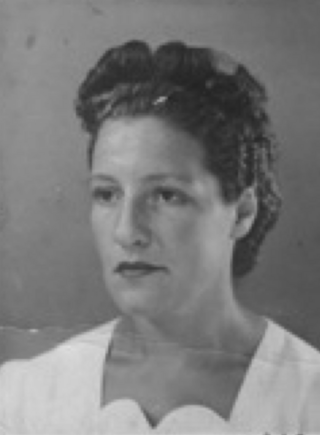Friederike (Fritzi) Löwy

Personalia
Born:
Died:
Profession:
Persecution:
Escape June 1939,
Submarine October September 1943 - May 1944
Memberships
Curriculum Vitae
Friederike 'Fritzi' Löwy was born in Vienna as the legitimate daughter of the Jewish master painter and later merchant Nathan Löwy and Josefa, née Czizek. Her Catholic mother had converted to the Jewish faith upon her marriage. Friederike Löwy grew up in Leopoldstadt as the youngest of the large family. She attended elementary school and then secondary school. At the age of 12, she joined the swimming section of the Jewish sports club Hakoah. Due to her successful but time-consuming competitive swimming career, she dropped out of a commercial school she had started after secondary school.
In 1923, Friederike Löwy became junior swimming champion, in 1927 she set the European record over 200 meters and by 1931 she had won a total of 25 championships. In addition to participating in international competitions, she also celebrated success in the popular Viennese swimming competition Quer durch Wien. Like her swimming colleague and friend Hedy Wertheimer, she was one of the best-known and most important Austrian swimmers of the interwar period and made a significant contribution to the success of the Hakoah sports club. She is best known for her crawl and synchronized swimming technique. Like other Jewish sportswomen, she was confronted with increasing anti-Semitism in everyday life and sport. She was disqualified and stripped of her victories, for example, and finally the Hakoah wrestling team protected the Hakoah swimmers after several violent riots at competitions. From 1927, Friederike Löwy is active in various professions, for example as a swimming coach and secretary for the lawyer Valentin Rosenfeld. As the only woman at the time, she also spent several years in the 1930s as managing editor of the news sheet of the Hakoah swimming club.
Friederike Löwy had to witness the downfall of a free and independent Austria when the German Wehrmacht invaded Austria on March 12, 1938. With the occupation of Austria, German legislation was adopted and with it the 'Nuremberg Racial Laws', according to which Friederike Löwy was classified as a 'Mischling I.
In June 1939, Friederike Löwy was able to flee to Italy and lived with her sister Anna Ungar, who lived in Milan. Anna Ungar was later deported to the Auschwitz concentration camp
I am not related to Mrs. Löwy. I knew her briefly before 1938, but I only really got to know her when I emigrated to Milan (as my wife was Jewish, I emigrated to Italy in Dec. 38). I know that she lived with a family in Milan and lost all her belongings and suitcases after Sept. 1943 (occupation by the German military).
SS soldiers searched this apartment at the time, but Mrs. Löwy was not present, otherwise she would have been taken away. She had to go into hiding from then on - she didn't dare return to this apartment. She was hiding with various people, but I can't say anything specific about that.
In Switzerland, she is granted official refugee status, which protects her from deportation and further persecution, but also from stays in various refugee camps, compulsory labor service and restricted freedom of movement. In Switzerland, she witnesses the liberation of Austria and the re-establishment of the Republic. She initially returned to Italy and emigrated to Australia in 1947 as she saw no future for herself in Austria. Three of her five sisters and four of her nieces were murdered in the Holocaust.
Ten years after Friederike Löwy left Austria, she returned to Vienna in 1949, also to look after her mother. She worked various jobs - for example in Walter Beck's company and in Paul Lamberg's Vienna office - but was probably also repeatedly unemployed. She also became involved again in Hakoah, which was re-founded in 1946, and helped organize the third Maccabiah - the largest international Jewish sporting event - in 1950. She joins the Austrian Social Democratic Party (SPÖ).
Friederike Löwy dies in Vienna at the age of 83 and is laid to rest in the Jewish section of Vienna's Central Cemetery.
Places
Residence:
Citations
Wiener Stadt- und Landesarchiv (WStLA)
Dokumentationsarchiv des österreichischen Widerstands (DÖW)
Wikipedia unter de.wikipedia.org/wiki/Fritzi_Löwy
Wien.Geschichte.Wiki unter www.geschichtewiki.wien.gv.at/Friederike_Löwy
